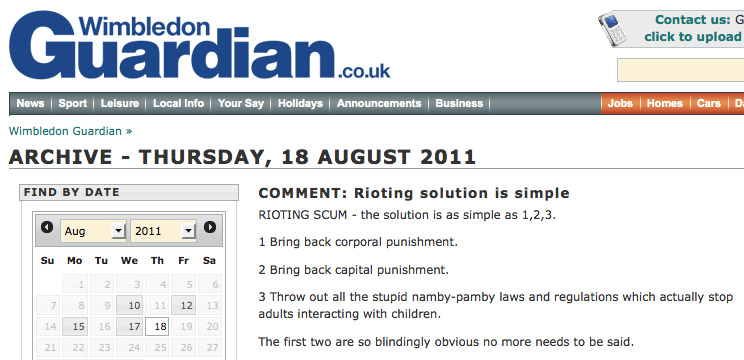An unsigned editorial that appeared on the pages of the Streatham Guardian and Wimbledon Guardian calling for the return of capital punishment does not represent the views of publisher Newsquest and was “just a bit of fun”, the papers’ group editor said this morning.
Speaking to Journalism.co.uk, Andy Parkes denied the editorials represented the views of Newsquest or Newsquest’s parent company, Gannett.
Parkes said the piece was “tongue in cheek” and “a bit of fun”, and had been “blown out of all proportion” in a post by the Guardian’s Roy Greenslade this morning, which initially claimed that the piece had been run across Newsquest’s South London Guardian series and elsewhere.
Parkes refused to comment on who wrote the piece at first, but later said: “You can put my name to it”. Pressed over whether he was the author, he refused to say any more, adding: “I absolutely don’t want to get into this any further”.
The hard-line leading articles – one of which was headlined simply “Rioting scum: the solution is as simple as 1, 2, 3” – call for capital and corporal punishment to be brought back in the wake of the recent rioting and looting.
The full comment reads:
RIOTING SCUM – the solution is as simple as 1,2,3.
1 Bring back corporal punishment.
2 Bring back capital punishment.
3 Throw out all the stupid namby-pamby laws and regulations which actually stop adults interacting with children.
The first two are so blindingly obvious no more needs to be said.
The third is equally sensible – allow parents to discipline their offspring as they need to, put power back into the hands of teachers and actually encourage, not discourage, adults to be involved with children.
Personally I’d ditch CRB checks altogether – after all, if you use points 1 and 2 correctly they would be far more effective than any CRB check could ever be. And, as for the suggestion an adult shouldn’t be allowed to carry other people’s children in the car… blah, blah, blah unbelievable. It’s no wonder adults are are terrified to get involved. I heard the other day that teachers are now discouraged from even raising their voices – the world’s gone mad.
Of course, if you’re looking for a more radical solution. One idea would be to simply arm pensioners. On the same day you get your bus pass you receive a handgun and the legal right to use it. Those in post office queues might be a bit more jumpy, but I guarantee we’d have a new-found respect for the elderly.
As well as appearing in print in the the Wimbledon Guardian and Streatham Guardian, the piece appears to have been published on the websites of the Lewisham and Greenwich News Shopper, Surrey Comet, Waltham Forest Guardian and Watford Observer, and Wandsworth Guardian. This was due to a “technical complexity” that meant content was syndicated automatically within London, a member of staff at the Wandsworth Guardian said.

